In 1970, children were “ready” to enter Grade One at Primary or Elementary School if they travelled independently around their neighbourhood (four to eight blocks from their house).
Six-year-olds could go to the shops and buy things by themselves or walk or ride to school if close enough. Children also knew how to explain to a police officer where they lived if asked.
These days, the police officer would probably arrest the parents for neglect if a six-year-old child was found four blocks from home by themselves.
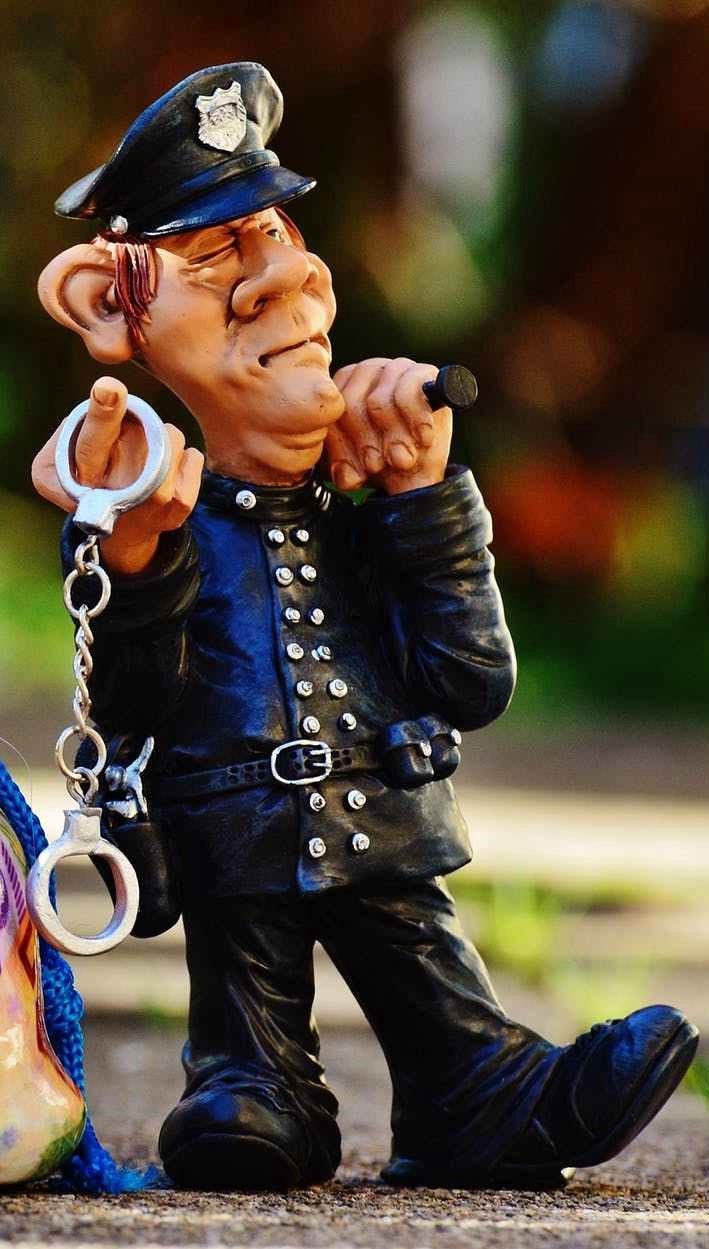
Times have changed, but is this always a good thing for our children?
I remember having a lot of freedom growing up. My mother would let me and my siblings play down at the park by ourselves two blocks away from our house. My brother was 7 or 8, I was 5, and my sister was 2 or 3. We weren’t entirely alone. According to my mother, we had a pet Rottweiler watch over us too, and “she would never have let anyone hurt you kids!”.
We rode or walked ourselves to and from school when my brother was in grade 5, I was in grade 3, and my sister was in grade 1. It wasn’t just a bike path either. We had to ride on roads, cross over a river and railway tracks, and not even at a designated crossing. My parents had to work, so we travelled by ourselves.
After school, we’d come home, open the door, make a snack, and play some games or watch TV until our parents came back from work. We were “latch key kids”, and I don’t think we minded too much at all.
Growing up, we played outside unsupervised by adults all the time. We were running around with the other kids on the street, playing a sport or making up games, having water bomb fights during the day or playing spotlight at night. We’d ride to the milkbar whenever we felt like ice cream or a snack and even did a paper round in the neighbourhood with my brother a few times well before we were old enough to work legally.
There were a few scraped knees, and maybe some storm drains that we shouldn’t have gone down. But I knew how to bike ride all over town to my friend’s places by my 10th birthday. Exploring places with my friends and without any parents were some of the best memories of my childhood.
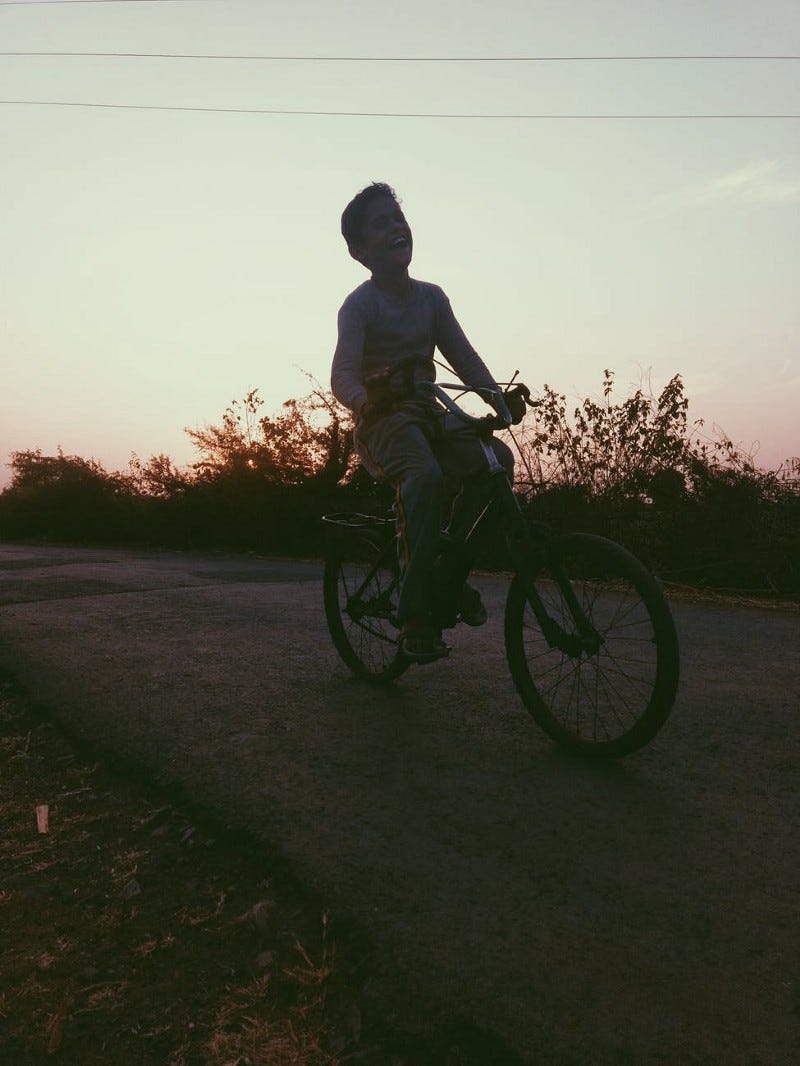
Fast forward to 2022, and most children will have to wait until they leave their family home to get the same amount of unsupervised time outside that I had before I was a teenager. They spend less time hanging out with their friends in person, and any time they spend is likely to be supervised by their parents or done alongside them, even when they go to the local shopping mall.
In her excellent book, ‘iGen: Why Today’s Super-Connected Kids are Growing up Less Rebellious, More Tolerant, Less Happy — and Completely Unprepared for Adulthood’, the author Jean Twenge says that as a result of the reduced freedom for our youth, the typical 18-year-old in 2022 is similar in maturity levels to what a 15-year-old was back in 1970.
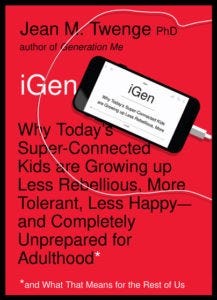
These days, children and adolescents are less capable of living, socialising, or working independently than the previous generations and are suffering more psychologically.
Depression, anxiety, narcissism and deliberate self-harm have all been increasing, and dramatically so since 2012. Unfortunately, this also coincides with the widespread proliferation of smartphones into our society.
Parents should give their children more freedom in the real world while also being more concerned about the safety of their children online. Adolescent girls appear to be particularly impacted by the introduction of the smartphone and the increased usage of social media that comes with this. As a result, suicide rates among teenage girls have risen to the point where they are now similar to suicide rates in boys of the same age.
What would you prefer to build in a child?
A. A conviction that they are amazing, just the way they are?
or
B. A belief that they can face and overcome most of the challenges they face in life if they learn from setbacks and feedback and apply themselves?
You may answer both, but what would it be if you had to choose one?
Self-esteem (A), defined by the Merriam-Webster dictionary as:
“a confidence and satisfaction in oneself”
or
Self-efficacy (B), which Psychologist Albert Bandura defined as:
“the belief in one’s capabilities to organize and execute the sources of action required to manage prospective situations.”
After decades of research, we now know that focusing on building a child’s sense of self-worth and self-esteem (A) at the expense of improving their capacity and self-efficacy (B) in learning and doing things by themselves can have some adverse side effects.
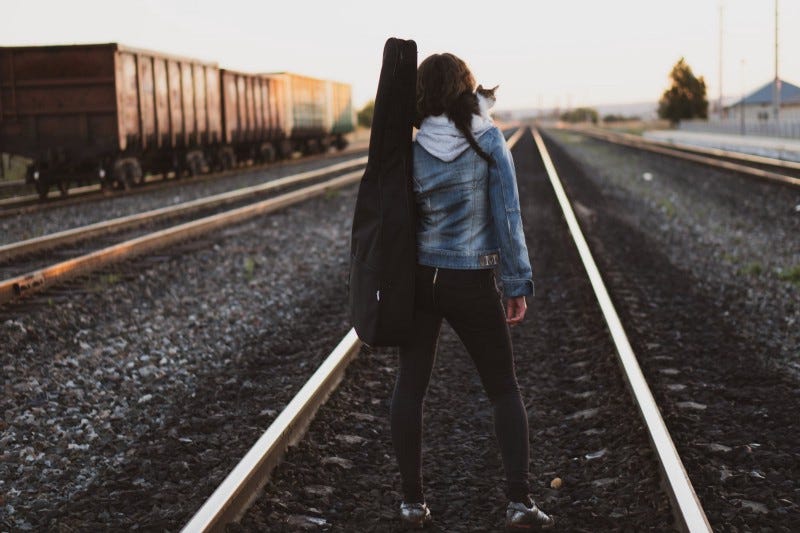
Research on Self-Esteem:
LOW SELF-ESTEEM IS NOT GREAT
- Low self-esteem correlates with increased violence, teenage pregnancy, suicide, low academic achievement and increased rates of school dropout (Misetich & Delis-Abrams, 2003)
- Living alone, being unemployed, having low socioeconomic status or having a disability is linked to lower self-esteem (von Soest, Wagner, Hansen & Gerstorf, 2018)
- 70% of girls believe that they are not good enough or don’t measure up in some way (Dove Self-Esteem Fund, 2008)
- Teenagers with low self-esteem have less resilience and a greater sense of hopelessness (Karatas, 2011)
HEALTHY LEVELS OF SELF-ESTEEM IS BENEFICIAL
- People with healthy self-esteem are more resilient and able to respond helpfully and adaptively to disappointment, failure and obstacles (Allegiance Health, 2015)
- In China, self-esteem significantly predicted life satisfaction (Chen, Cheung, Bond & Leung, 2006)
- School programs that build self-esteem in primary school children also reduce problem behaviours and strengthen connections between the students (Park & Park, 2014)
HIGH SELF-ESTEEM ISN’T ALWAYS A POSITIVE
- Abraham Maslow put self-esteem as a need in his hierarchy of needs pyramid. However, he later noted that individuals with high self-esteem are more apt to come late to appointments, be less respectful, more casual, more condescending, and much more willing to make themselves comfortable without bidding or invitation.
- Carl Rogers, another Humanistic Psychologist, got so sick of new staff coming into his Western Behavioural Sciences Institute with no desire or ability to work that he once sent out a letter that said, “less self-esteem please; more self-discipline!”
- People with fragile or shallow high self-esteem are no better off than individuals with low self-esteem. They engage in exaggerated tendencies to protect, defend and enhance their feelings of self-worth (Kernis, 2008)
- Academic performance is weakly related to self-esteem, with some students doing worse academically after their self-esteem increased (Baumeister, Campbell, Krueger & Vohs, 2005)
Baumeister has looked extensively into the issues with some types of high self-esteem. He found that:
- Students with high self-esteem tend to overestimate their abilities. They also like to boast to others about what they can do.
- High self-esteem doesn’t make people more attractive to others; it just makes the individual think they are more attractive
- Bullies at school and work tend to have higher reported levels of self-esteem
- People with high self-esteem are more likely to take risks and engage in unprotected sex. They tend to be impulsive and not think through the consequences of a decision before acting
- People with high self-esteem are more likely to be prejudiced against others. They tend to be smug and superior when interacting with others
- People with high self-esteem are less likely to work through and overcome relationship conflicts. They can be abusive in relationships and assume their needs come first no matter what situation they are in
- People with high self-esteem seem blind to their faults and are less likely to learn from experience, change or improve themselves
Research on Self-Efficacy:
SELF-EFFICACY HELPS PEOPLE AT WORK
- A meta-analysis of over 100 studies found a moderately strong correlation (.38) between self-efficacy and job performance (Stakjovic & Luthans, 1998)
- Another meta-analysis found that high self-efficacy is related to better emotional stability and greater job satisfaction (Judge & Bono, 2001)
- Greater self-efficacy leads to less burnout for teachers (Skaalvik & Skaalvik, 2007)
- Increased self-efficacy in nurses can improve their work performance, reduce turnover rates and protect them from exhaustion (Fida, Laschinger & Leiter, 2018)
SELF-EFFICACY HELPS STUDENTS AT SCHOOL
- High optimism and self-efficacy in students lead to better academic performance, greater coping with stress, better health, and more satisfaction with school (Chemers, Ju & Garcia, 2001)
- Increased self-efficacy leads to more enthusiasm and commitment to learning in students who had previously been struggling to read (Margolis & McCabe, 2006)
SELF-EFFICACY CAN IMPROVE HEALTH OUTCOMES
- Patients with cancer with high self-efficacy adjust to their diagnosis better and are more likely to adhere to their recommended treatment (Lev, 1997)
- Patients with high self-efficacy who have joint replacement surgery exercise more frequently and improve their performance more after the surgery (Moon & Backer, 2000)
- Improving self-efficacy can increase how much previously sedentary adults exercise, which then enhances their overall health (McAuley, 1992)
- Parental self-efficacy can reduce the risk of postpartum depression in new mothers (Cutrona & Troutman, 1986)
- Low self-efficacy is related to anxiety (including social anxiety and panic attacks) and depressive symptoms (Muris, 2002)

What Can We Do?
I’d rather have my children go to a school where teachers are more like Supreme Court Chief Justice John Roberts. Here’s an excerpt from his excellent commencement address to his son’s year nine graduating class in 2017:
“From time to time in the years to come, I hope you will be treated unfairly, so that you will come to know the value of justice. I hope that you will suffer betrayal because that will teach you the importance of loyalty. Sorry to say, but I hope you will be lonely from time to time so that you don’t take friends for granted. I wish you bad luck, again, from time to time so that you will be conscious of the role of chance in life and understand that your success is not completely deserved and that the failure of others is not completely deserved either. And when you lose, as you will from time to time, I hope every now and then, your opponent will gloat over your failure. It is a way for you to understand the importance of sportsmanship. I hope you’ll be ignored so you know the importance of listening to others, and I hope you will have just enough pain to learn compassion. Whether I wish these things or not, they’re going to happen. And whether you benefit from them or not will depend upon your ability to see the message in your misfortunes.”
Chief Justice John Roberts
I want our kids to learn life lessons that help them gain the skills and knowledge required to function as independent adults in the world.
I want children to be physically and mentally healthy and suffer less from emotional and psychological disorders.
I want them to develop high self-efficacy and a belief that they can do something by trial-and-error and effort rather than assuming that they are great no matter what they can do.
How Do We Build Self-Efficacy?
According to Bandura and Akhtar (2008), there are four main ways to build self-efficacy in our children’s lives:
- Mastery experiences: Ensure that your child has regular opportunities to take on and tackle new and challenging tasks that are just outside their current level of comfort and competence. By pushing themselves with these tasks, they will gain more self-efficacy than repeating something they already know how to do.
- Vicarious experiences: Ensure that your children have positive role models or mentors that they can observe doing the things you want them to know how to do. It could be you, another family member, a friend of yours or a coach. Because you are likely to spend more time with them than other people, it is essential to model the behaviours, mindset and skills you want them to learn. If you do this, they can learn from you, emulate what you do, and then get feedback on how they are going and keep improving these skills.
- Verbal persuasion: The type of words used in self-talk and with others can significantly affect how much self-efficacy one feels. Like Dr Carol Dweck says, in promoting a growth mindset rather than a fixed mindset, we need to praise effort and what children do (their actions and intentions) rather than who they are as a person or what the outcome was. It builds up a greater desire to take on more challenging tasks in the future instead of the fear of being wrong, not succeeding, or not being “smart enough”.
- Emotional and physiological states: We need to focus on children’s overall mental and physical health and well-being. If they are sick, tired, sleepy, hungry, stressed, depressed or anxious, it will be more challenging for them to maintain a high level of self-efficacy, and belief in their ability to successfully tackle a challenge will decrease. By helping children look after the other areas of their health, they are more likely to have the energy and confidence to take on whatever is in front of them, overcome setbacks, and persist until they have achieved their goals.
For more information and ideas on how to help kids to build resilience and self-efficacy, please visit the Let Grow website or learn more about the Free Range Kids’ Movement.
Crime rates are now at their lowest point since 1963. Thanks to many societal changes, your children are physically safer growing up, yet they have way less freedom. Would you be willing to supervise your children a bit less and let them do more in the real world by themselves or with their friends if it helped them grow into independent, resilient and capable adults?
Dr Damon Ashworth
Clinical Psychologist
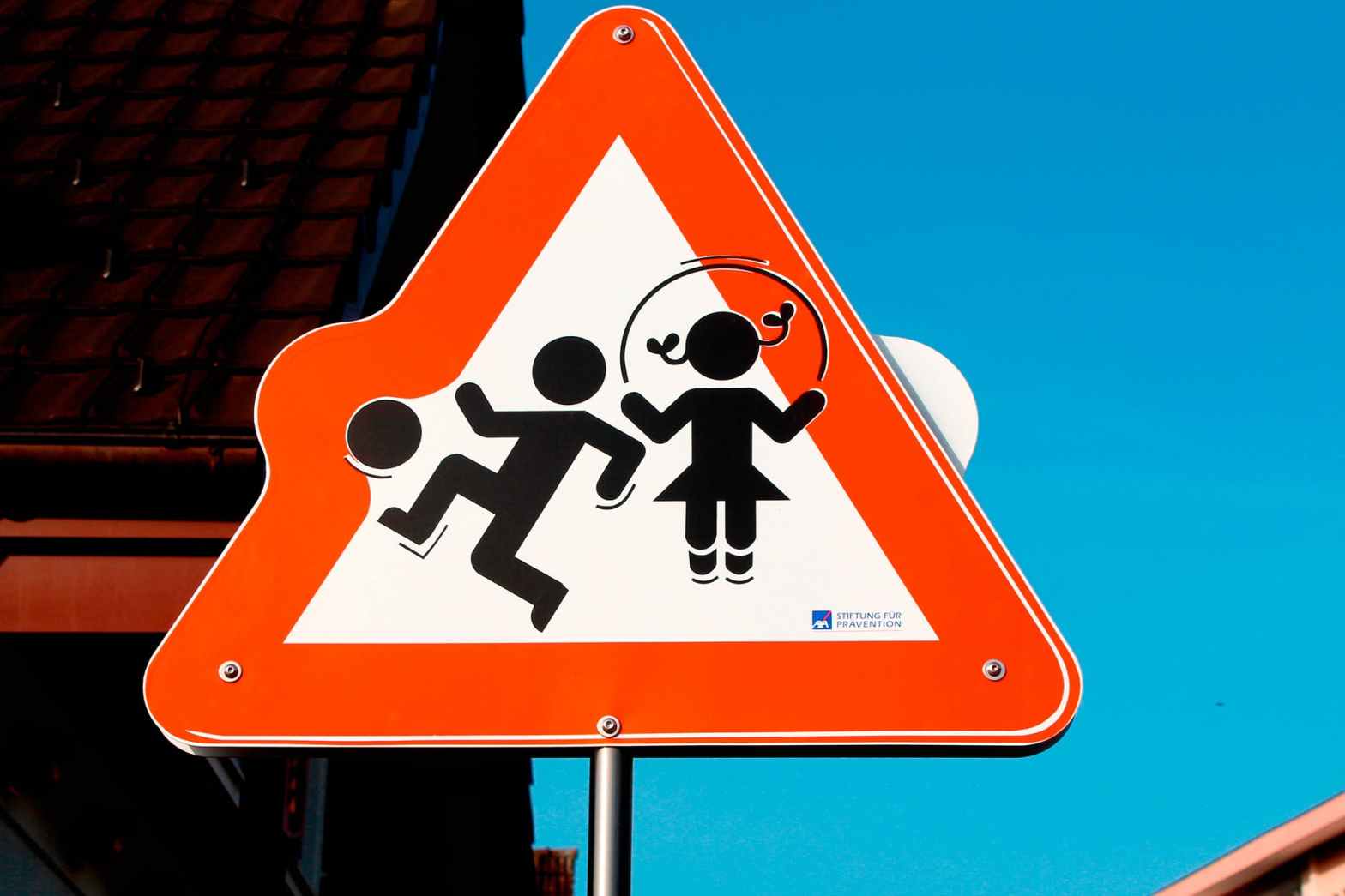
An excellent analysis. Your distinction between self-esteem and self-efficacy corresponds roughly to what I’d call self-esteem (feeling good about ourselves) versus self-respect (knowing from experience what we can do, and taking pride in what we’ve accomplished).
A lot depends on attitude: we can see misfortunes either as tragedies to suffer or as challenges to overcome. Only the latter attitude contributes to self-respect.
Also taking Haidt and Lukianoff’s book as a starting point, I wrote about some of the same issues last year:
https://the-1000-year-view.com/2018/11/26/challenge-makes-us-stronger/
LikeLiked by 5 people
Thank you, I really liked your article too!
LikeLike
Enjoyed this so much!
LikeLiked by 2 people
I always enjoy your writings. I just wanted to add that I don’t feel crime is less these days then back in 1963, but I suppose the kind of crimes have changed because of DNA testing. However more crimes involving children are at its highest , that I’ve ever known. I feel the children of today are less equipped to cope with things and possibly because today they have cell phones and internet at their fingertips and it’s a good thing in one way, but not so good in other ways.. since some of the struggles “we as kids” went through helped teach us lessons and coping skills…as I also find, it’s very difficult, in trying to compare today’s children to yesterday’s children because sooo much has changed in so many ways .. as compared to my mothers generation (40’s and 50’s) and then mine (I grew up in the 60’s and 70’s) a lot changed but mainly in styles, values and politics. Yet not in major technology other than well, radio and television , but even though those were ‘big deals’ they were ‘fun inventions’, but not game changers like the technology we have 😎today! Whoa is it different!!
LikeLiked by 2 people
Thank you. It’s interesting about the crime rates. We hear much more about them these days thanks to all the different news channels and social media, but there are a few books that highlighted to me how much things have actually improved, especially since the 1970s. I’d recommend the book ‘Enlightenment Now’ by Steven Pinker if you haven’t read it yet for a nice overview of all the things that have improved.
LikeLiked by 1 person
Thank You. Yes I will check that out. I do believe things have improved, with new and better technology we have today it has helped deter a lot of crime, but it’s the mental and emotional personal crimes I feel may have risen (which coincides with the subject that you were speaking of ) 😀 I enjoy hearing different perspectives from others , no one is really wrong or right (unless morally of course) just perspective and how we each view things..👍😁
LikeLiked by 1 person
Exactly!
LikeLike
Your article are really informative! As a college student, I myself haven’t been prepared for adulthood. And I’m always frustrated. Perhaps I was overprotected when I was a teen. What comes with freedom are challenge, responsibility and risks. I’m still improving myself. Thank you for the great article! Keep up the good work!
LikeLiked by 3 people
Thank you!
LikeLike
Great post!
LikeLiked by 2 people
Thanks!
LikeLiked by 1 person
This is an excellent post. I’m surprised that there’s less crime now. With all the stories about child/human trafficking, you get the impression that this is the most unsafe time ever. It makes me sad that my children haven’t tasted an ounce of the freedom that I had well before their ages. I try to do my best to give them as much as I can safely.
LikeLiked by 2 people
Yeah it’s pretty sad. There were some really successful campaigns (like the pictures of missing children on milk cartons in the 1980s) and interventions (like the amber alerts if a child is abducted in California) that made us much more aware of these crimes when they do occur. And of course there is the amount of news coverage we’re exposed to. Fortunately, they are fairly rare events. and becoming less prevalent over time.
LikeLiked by 1 person
Great post! I am not a doctor but I’ve taught martial arts and worked in high schools and higher education for many years, and I have seen the change in attitudes and development of our younger generations. It is so sad to see.
LikeLiked by 3 people
I very much agree with you. I taught preschool for 15 yrs. It had gotten so bad I couldn’t take it anymore. I felt like all of the new rules made the classroom a more dangerous place, and my hands were too tied to do anything about.
LikeLiked by 3 people
Very interesting. I miss and long for my daughter to have some of the freedom that I had as a child. However, I think we have to a certain degree glamorized that freedom. Mine came with a lot more than scraped knees. Bullying, early exposure to alcohol, drugs and sex to name a few. If I sent my kid to our local park about 5 blocks away- she’d be the only one there alone and DCF would most likely get called. Is that correct? IDK. I think we need to look at ways to create independence and freedom in our children but not necessarily recreate what once was. I don’t believe it was the glory days it being made out to be either.
LikeLiked by 3 people
Absolutely. I wrote another post about the error of nostalgia, so I definitely agree with you there. iGen children aren’t complaining about their loss of freedom in general either, and are worried about their safety too. The biggest dilemma I think about is how do we best prepare children to be adults that are able to thrive at work, at home, and socially once they are older.
LikeLike
Exactly. I tell my child regularly that I am not truly helping her by doing age/ developmentally appropriate tasks for her just because it’s challenging. Parenting is a tough job!
LikeLiked by 1 person
Thank you for easing my worry today by showing me I am teaching my son to be resilient although my gut is screaming to rage like an overprotective mother bear.
Mr 5 and Miss 4 take a private bus to school and home so I can work school hours. They are the only little kids on the bus and they told us the older kids slapped and scratched my son yesterday. His ear was bleeding.
Confiding in us took guts so we acted by speaking to the bus driver about keeping the little kids at the front where he can see them. Documenting and alerting the school and we had a meeting this morning because this is not acceptable.
BUT… Today they went on the bus again and will come home on it too. My heart aches and I want to protect but my gut also says he needs to learn we will act to keep him safe but he must also learn to guard himself by staying with his peer group and knowing if someone touches him to speak up loudly because that is not ok.
How hard it is though to have to watch your gentle kid slowly learning not everyone is kind or nice.
LikeLiked by 1 person
That does sound tough. It’s awful that the bigger kids were picking on your son, but great that he was able to open up to you and that both the school and the bus driver know about it and can hopefully help out by enforcing consequences and reducing the risk of it happening again. I think what people don’t realise sometimes is that there risk with everything. One bad thing happens, and that is seen as evidence that things shouldn’t have been done that way. But we can’t protect ourselves and our children from everything, and that wouldn’t be in our or their best interest either.
LikeLiked by 1 person
Great read, thanks for sharing
LikeLiked by 2 people
As an amateur in the universe that is psychology, I always enjoy reading your pieces; they challenge my mind. While I don’t always agree with some of the “experts” in the field, I tend to accept their premises as valid, at least for them. I have one major issue with the self-esteem issues of today, that being how does one tell the difference between sound self-esteem based on ability and arrogance which appears to be built on illusion?
LikeLiked by 3 people
Thank you. It’s a good question. I think it may be better to focus on another concept apart from self-esteem that taps into capacity or ability rather than just belief. That’s why I’ve spoken about self-efficacy, but there may be better terms out there too!
LikeLike
So this post basically prepares me to plan my future lessons better. Reading your wise words always help. Thank you!
LikeLiked by 2 people
Thank you 🙂
LikeLike
Yes! This is a very serious condition of modern culture and environment. I am so much scared of being a parent as I always have a fear of protecting my children from those cruel mentalities and people. This article is very useful for both parents and their children. Thank You so much for such stuff..
LikeLiked by 2 people
Thank you!
LikeLike
A fantastic and informative article. It chimes with everything I’m trying to achieve as a single parent!
LikeLiked by 2 people
Thanks!
LikeLike
Great post. I agree completely with everything you said.
I’m surprised, though, that you recommended “The Coddling if the American Mind”, though. My father-in-law (paranoid, right-wing, I’m going to stop right there…) left that for me to read during his last visit. It has some good points, but overall it’s a propaganda piece, or that’s how it felt.
Anyway, very enjoyable piece and I was about to share it to my website’s FB audience, but I just can’t get down with that book recommendation. 😉
LikeLiked by 3 people
Thanks for your comments Sue. I might have to read it again. I don’t identify with being right wing at all, and didn’t see it as being propaganda, but I have been accused of being too trusting on multiple occasions by others.
LikeLike
I couldn’t even read the entire post I was laughing so hard. I was a latch-key kid and share the same memories. Playing in the streets with our friends at 4 or 5 all day barefoot except for potty breaks and eating. they are the memories I love. The only scare I recall was a car following me and my bestie walking home everyday for a long time and the big scare of possible razor blades in apples at Halloween. I knew my friends parents, they often feed the crew, occasionally someone would call out “it’s time for water” and no doubt a parent looked out to the street when we weren’t looking. I would not trade that and you’re on spot that it makes kids more imaginative, build stronger relationships, and confident as they grow their wings. Crime is still a huge problem is Dallas, for as long as I can remember, including when we lived in those ghetto’s the City Manager and staff have overlooked and overpromised the poorest areas. For the last 5-6 years they are focused on building parks which is great but they are not in the neighborhoods that need them and it’s because they get overrun by crime, valandalism and many deaths by shooting. The streets are not maintained, water and sewer systems not updated and break constantly. They are often in flood plain areas which flood several times are year and the people have to continue to live their. I don’t even listen anymore to what they are going to do because the money is always spent to attract business and not help the oldest and poorest areas. They can’t trust police either because there is a huge shortage of officers and very few trained in mental illness and many shootings are unnecessary. It’s a vicious cycle that’s gone on since before I was born in 1963. It’s a damn shame. I like your subtle message in the graphic. 🙂
LikeLiked by 1 person
Thank you. I was looking at some of the crime data for Dallas, and it does look pretty challenging, including double the nationwide average of crime and higher than the texas average too. There are a few stories that suggest that it is heading in the right direction, like this one, so I hope that continues! https://www.keranews.org/news/2024-02-13/dallas-overall-violent-crime-rate-drops-nearly-30-but-business-robberies-increase-over-last-year
LikeLiked by 1 person
I have heard too many times Dallas is moving in the right direction, maybe for Dallas businesses but not the people. I will believe that when I see it. I was born in West Dallas and we lived in projects when I was born. In 61 years, Dallas has never improved the standard of living on the poor in the city. Just the facts. They have an excellent Police Chief now, better than a long time but they get limited funds, and their down over 300 officers. Officers get not mental illness training and people are being shot first, even from outside of the house. It’s an outrage. I live in Plano, an upscale neighborhood north of Dallas. I had a stalker for 7 months and they broke me down. I ask my neighbor to call the police. 4 cars and 2 firetrucks show up, a female officer jumps out of the car and has her gun pointed at me. the second car was full of rookies, she continually kept screaming I was Schizophrenic and was telling each officer not to talk to listen to me. She said that with one call she could have me looked up in Parkland and I would never get out. If I would have been clear headed I would have put her in her place but I was scared to death my stalker was going to kill me and had skipped my Xanax that day. sadly the sr. officer knew me, knew I helped the kids behind us when their father killed their mother and then killed himself. Once inside the house, I reminded him of that day, he said the entire crew from that was still shaken by the incident. Yet, he let her pull a gun on me and never told her to shut up. I was lucky, people is Dallas are being shoot on site. Why can’t they taser? Why can’t they get proper training, it’s because it not a priority and the city has cut their budget. It’s a vicious cycle and is one of the reasons I no longer watch the news. A long way to get to the point. The people who ranked Dallas at the 19th top city are the ones living in the richest neighbors around who get their streets fixed, their trash picked up, the city maintains the public propter around the neighborhoods and of course they are happy. The poor don’t even know about the study or get a chance to answer. I was born in Dallas but would never live there again. Reality sucks! 🙂
LikeLiked by 1 person